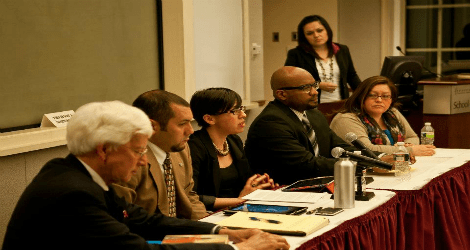Princeton Theological Seminary
Association of Latin@ Seminarians Alumni Panel
By Ariana Salazar-Newton View and print as PDF.
View and print as PDF.
On March 29, 2012, at Princeton Theological Seminary (PTS), students, alumni, faculty, administrators, and even prospective students gathered for the Association of Latin@ Seminarians alumni panel: “Remembering Our Community: Empowering the Latin@ Community at Princeton Theological Seminary.” The agenda for the evening was to recover the cultural memory of Latin@ students at Princeton Seminary.
This event was a long time coming. For years, Latin@ students, and their many supporters, have put time and energy into making PTS a more hospitable campus to diversity at all levels of the institution—in the curriculum, the student body, the staff, and most importantly, the faculty.
The last five tenured senior scholars to leave Princeton Seminary were people of color and the last four hired were white men. Among the departures was Dr. Luis Rivera-Pagan, the sole Latin@ professor this school has ever known. Since his departure in 2007, and despite the urging of Latin@ students and their supporters, his seat has not been filled. A student movement has been percolating for years: letters have been sent to those in positions of power; Student Government approved proposals for diverse hiring practices in both 2007 and 2009 have been passed; resolutions for why PTS needs a Latin@ scholar have been submitted; student testimonies regarding what is missing at PTS have been dispersed; and in 2010, the Association of Latin@ Seminarians’ Executive Board even met with President Iain Torrance. And still, of the forty-seven member faculty, PTS has zero Latin@ scholars.
Such were the memories that we were trying to recover at this year’s panel, particularly because most of those former movers and shakers have graduated, and in their place PTS has welcomed the largest incoming class of Latin@ students in the history of the seminary. While these numbers are a victory for the Latin@ community on this campus, it presented this year’s Executive Board with a unique challenge: to create critical consciousness of the Latin@ struggle for justice at PTS to a group who did not know about those who had gone before them. The plan: invite alumni to speak for themselves. And that we did.
As Moderator of the Association of Latin@ Seminarians, I invited five panelists, each representing the diversity existent in the Latin@ community. From church ministers to academics, from graduating as early as 1972 to as recently as last year, from various denominations to even various ethnic origins—Mexico, Dominican Republic, Venezuela, and Puerto Rico—we were careful to compile a critical core of Latin@s to educate our seminary community. In addition to discussing the Latin@ struggle at PTS, we also intended this evening as an avenue for the larger community to learn about Latin@ culture, which will no doubt continue to be a growing presence in our classrooms, churches, and organizations to come.
The Panelists:
David T. Abalos, Ph.D.
Author of Latinos in the United States: The Sacred and the Political.
He has taught Latino Politics at Princeton University and Yale University.
Rafael C. Gómez, Ph.D. Candidate
Ph.D. Candidate at the University of Albany, SUNY, in the Latin American and Caribbean Studies Department.
Linda Jimenez, M.Div
Lilly Resident in Ministry at Fifth Avenue Presbyterian Church.
Matilde Moros, Ph.D Candidate
Assistant Dean at New Brunswick Theological Seminary.
Ph.D. Candidate at the Drew University in Religion and Society.
Amaury Tañón-Santos, D.Min.
Director of Programs, including Hispanic/Latino(a) Leadership Programs, at the School of Christian Vocation and Mission at Princeton Theological Seminary.
In the end, the event was an enriching evening. Latin@ students got to see a cohort of their people out in professional and ministerial sectors, and making a difference in their respective communities. They also gained awareness of those who have walked these sidewalks before them, discovering that the tension they are living with on this campus is a shared struggle of previous Hispanic students, their comunidad. What this will amount to in the years to come is yet to be determined.
One statement, from Dr. David T. Abalos, stood out from the rest. As author of several books on developing personal, political, historical and religious strategies of transformation to address the needs of marginalized communities, especially Latinos, Dr. Abalos closed the panel off with a benediction-like charge to students, faculty, and administrators. In his statement he talked about different kinds of seminary students (i.e. competitive, compassionate, and so forth) and the different stories that create such practitioners. He closes by advocating for different stories: the stories of transforming love in friendship, the guide and the gift of the story of intimacy, the ability to be close to our self, and to love our personhood as the face of the deepest sacred source. Frankly, we were lucky to receive such a word of encourage from such a respected scholar and partner in our struggle for a Latin@ professor.
Ariana Salazar-Newton is a third generation Mexican American from southern California. She is currently working on her Master of Divinity and Master of Arts in Christian Education at Princeton Theological Seminary. Her academic interests lie with race, gender, sexuality, and class—particularly the tensions experienced by Mexican Americans.











Pingback: Five Articles on Social Justice from Princeton Theological Seminarians | Mystic Modern – Spirituality, Science, Humanity
Pingback: Ave verum corpus, natum | Black Nights, White Days – a Bipolar Seminarian